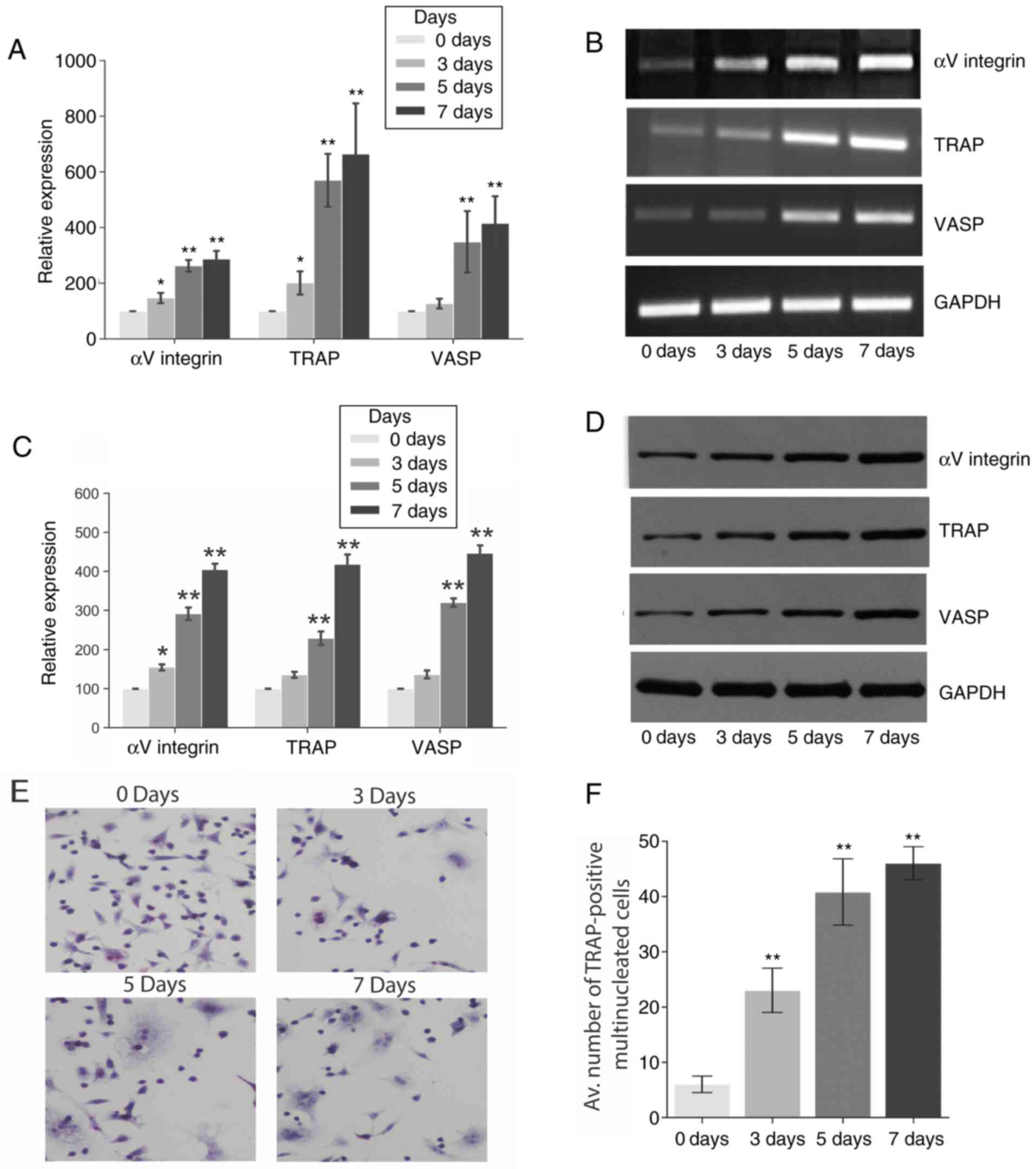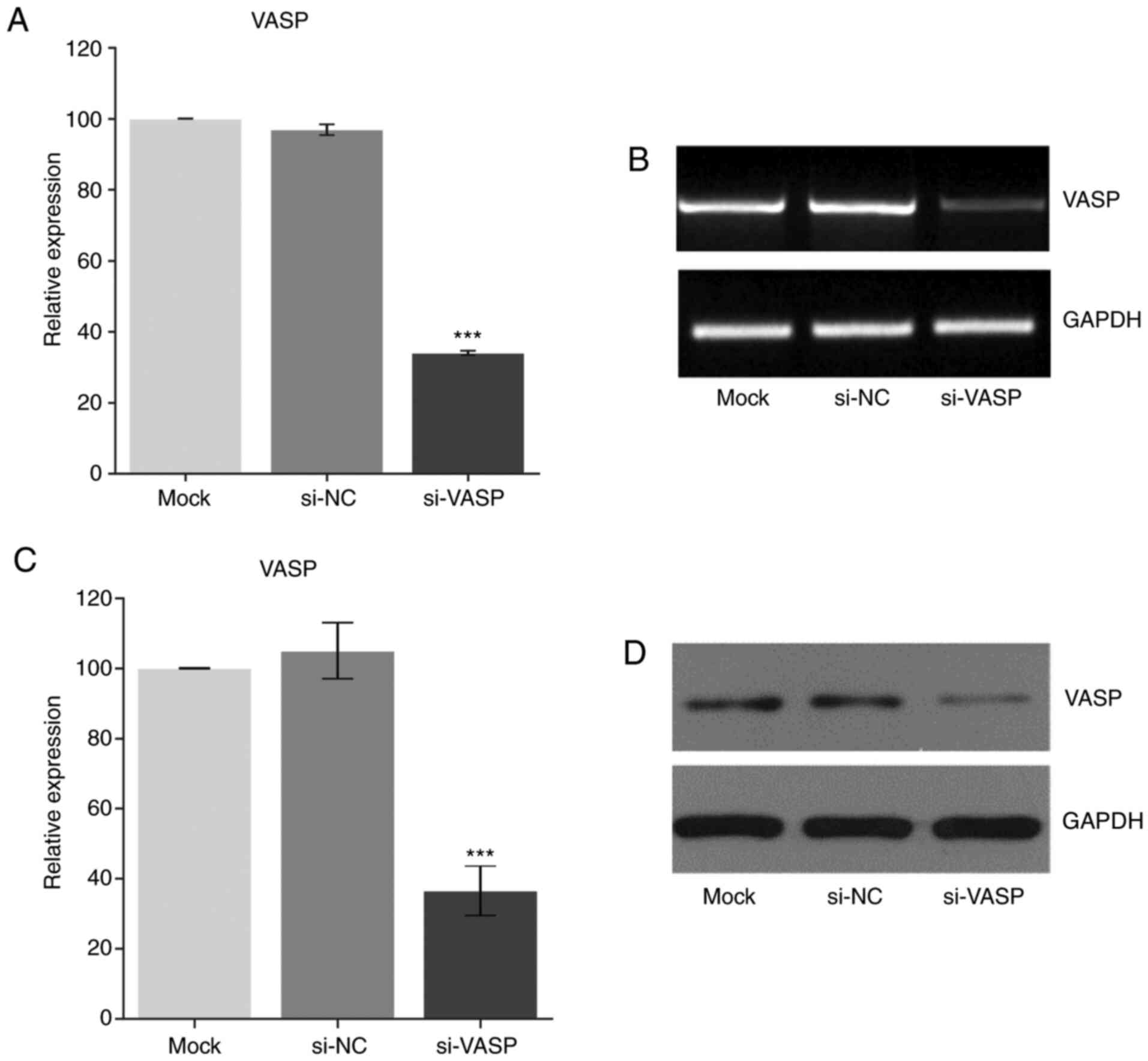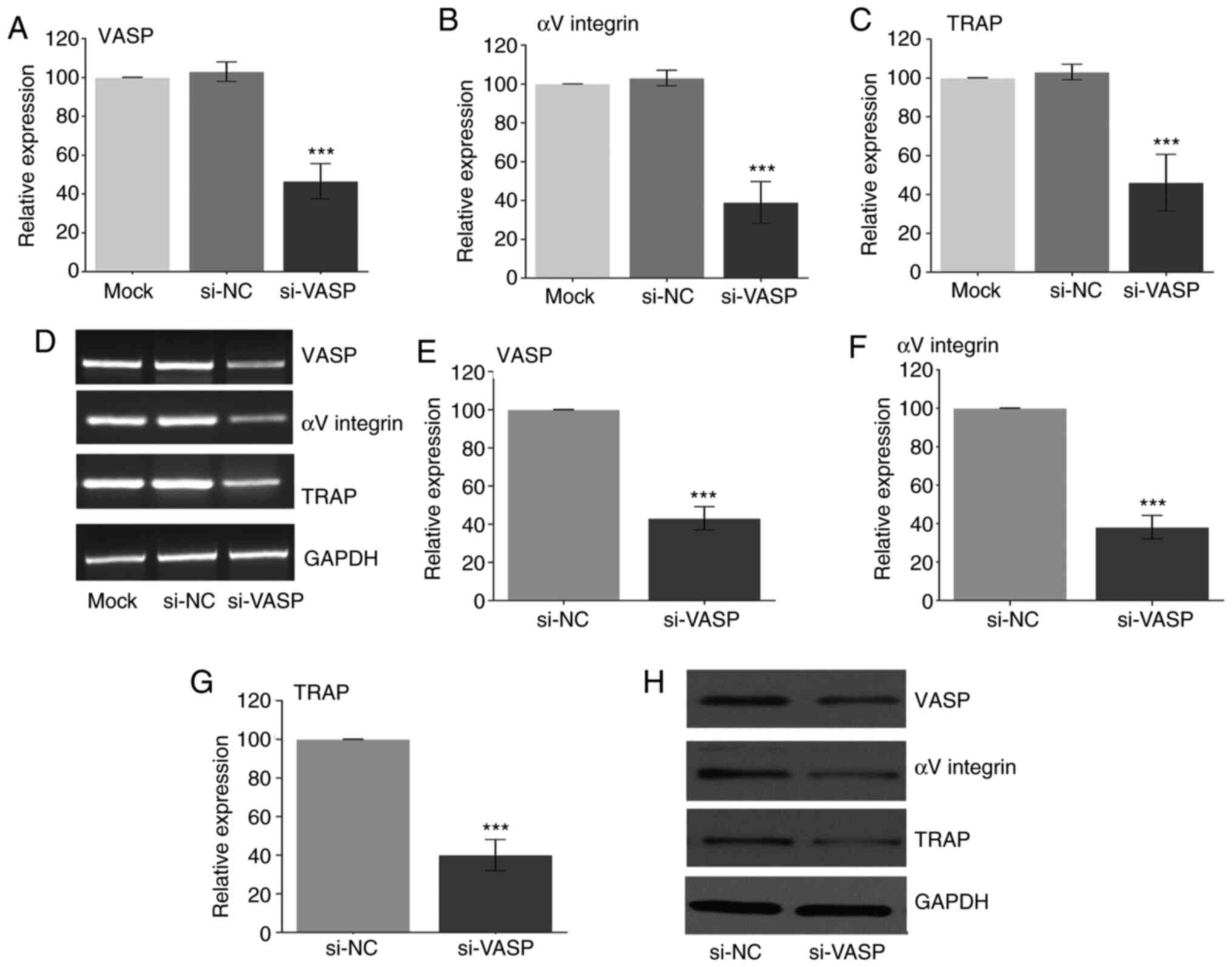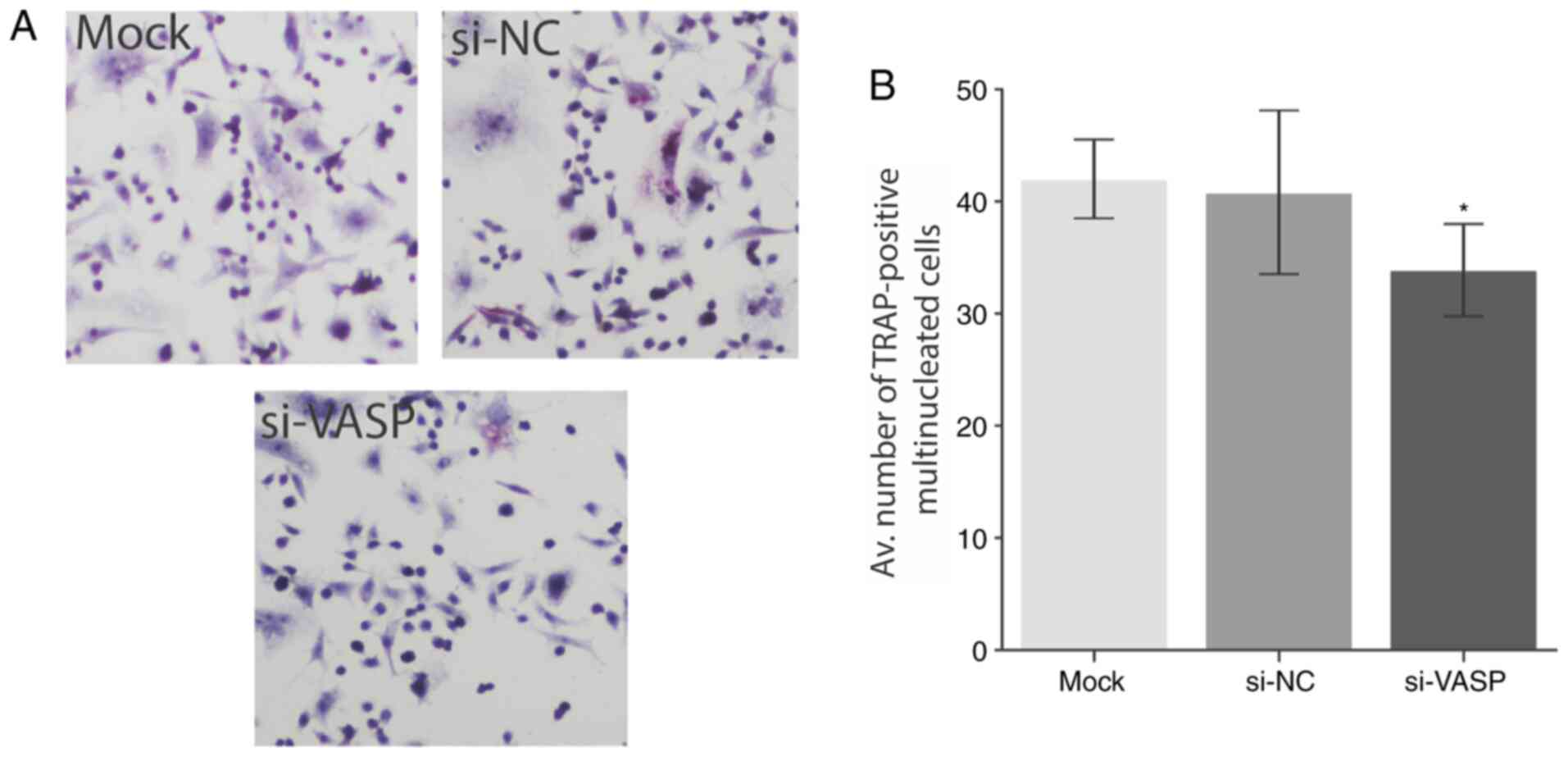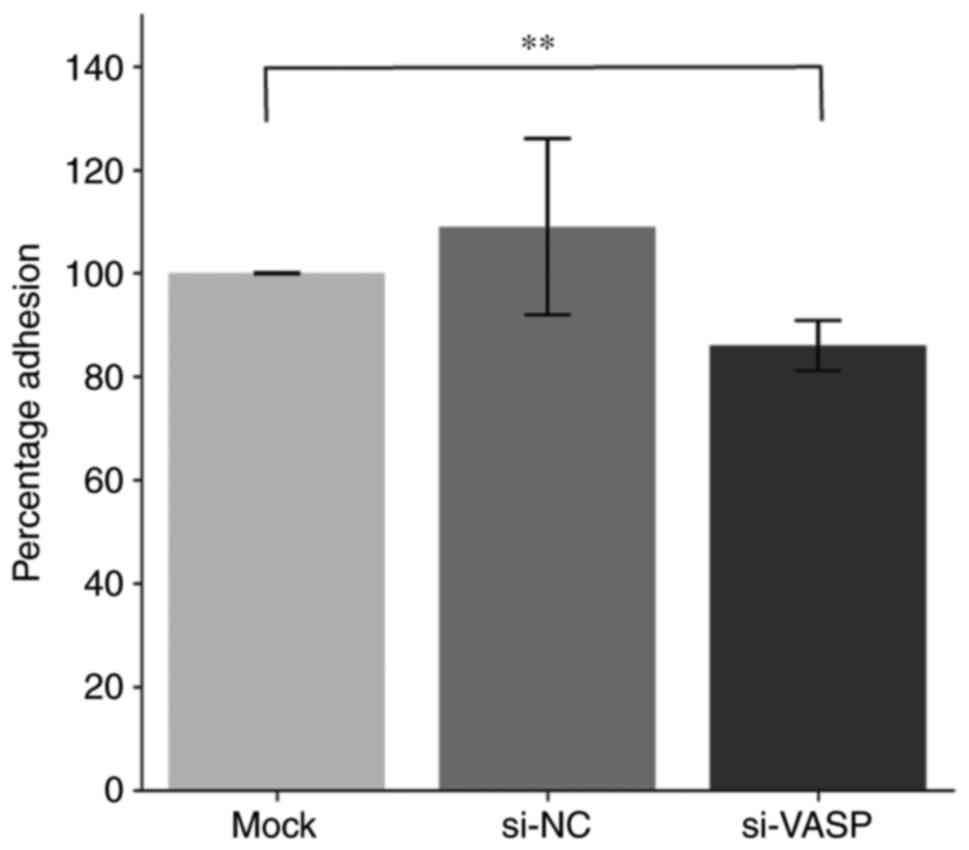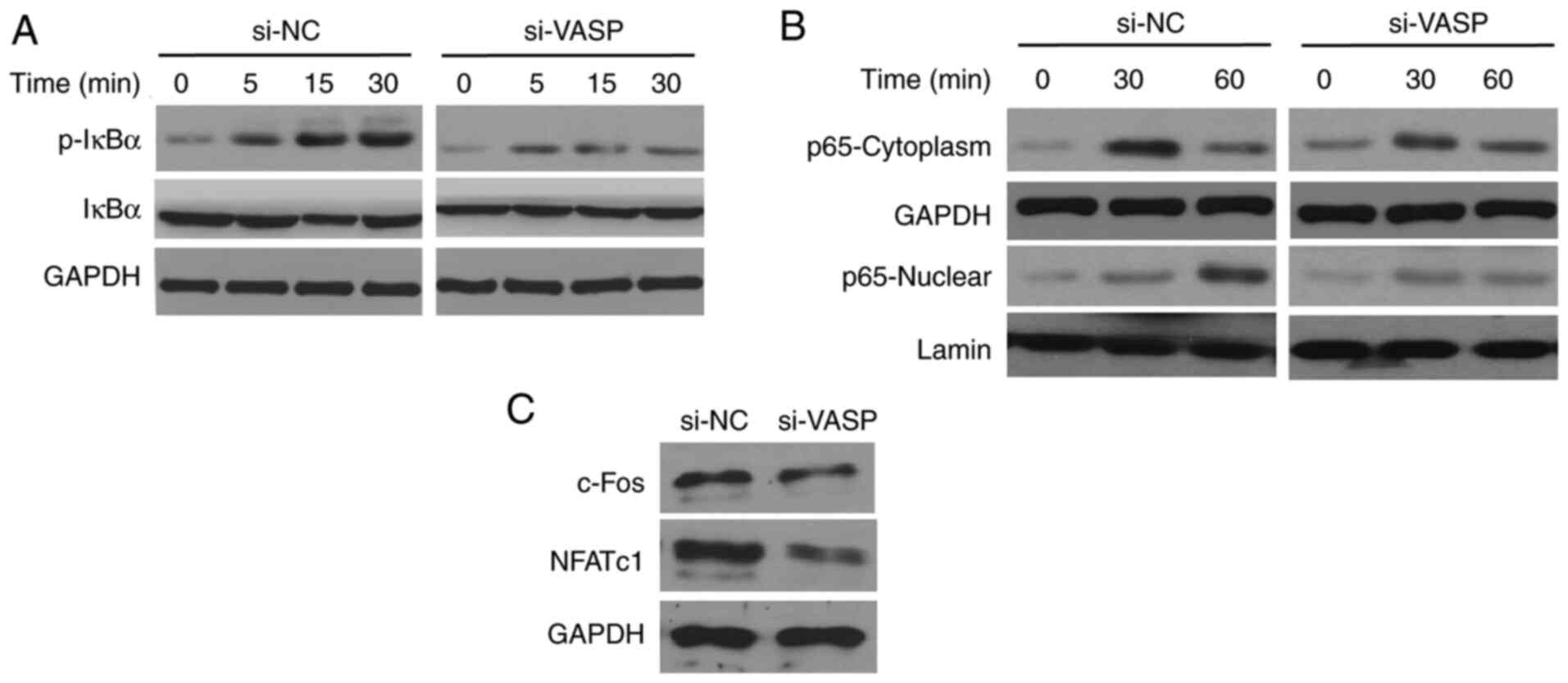|
1
|
Rachubik P and Piwkowska A: The role of
vasodilator-stimulated phosphoprotein in podocyte functioning. Cell
Biol Int. 43:1092–1101. 2019.PubMed/NCBI View Article : Google Scholar
|
|
2
|
Wu G, Wei L, Yu A, Zhang M, Qi B, Su K, Hu
X and Wang J: Vasodilator-stimulated phosphoprotein regulates
osteosarcoma cell migration. Oncol Rep. 26:1609–1615.
2011.PubMed/NCBI View Article : Google Scholar
|
|
3
|
Li K, Ma YB, Tian YH, Xu XL, Gao Y, He YQ,
Pan WT, Zhang JW, He CJ and Wei L: Silencing lncRNA SNHG6
suppresses proliferation and invasion of breast cancer cells
through miR-26a/VASP axis. Pathol Res Pract.
215(152575)2019.PubMed/NCBI View Article : Google Scholar
|
|
4
|
Aszódi A, Pfeifer A, Ahmad M, Glauner M,
Zhou XH, Ny L, Andersson KE, Kehrel B, Offermanns S and Fässler R:
The vasodilator-stimulated phosphoprotein (VASP) is involved in
cGMP- and cAMP-mediated inhibition of agonist-induced platelet
aggregation, but is dispensable for smooth muscle function. EMBO J.
18:37–48. 1999.PubMed/NCBI View Article : Google Scholar
|
|
5
|
Bonello L, Camoin-Jau L, Armero S, Com O,
Arques S, Burignat-Bonello C, Giacomoni MP, Bonello R, Collet F,
Rossi P, et al: Tailored clopidogrel loading dose according to
platelet reactivity monitoring to prevent acute and subacute stent
thrombosis. Am J Cardiol. 103:5–10. 2009.PubMed/NCBI View Article : Google Scholar
|
|
6
|
Park JH, Lee NK and Lee SY: Current
understanding of RANK signaling in osteoclast differentiation and
maturation. Mol Cells. 40:706–713. 2017.PubMed/NCBI View Article : Google Scholar
|
|
7
|
van Dam PA, Verhoeven Y, Trinh XB, Wouters
A, Lardon F, Prenen H, Smits E, Baldewijns M and Lammens M:
RANK/RANKL signaling inhibition may improve the effectiveness of
checkpoint blockade in cancer treatment. Crit Rev Oncol Hematol.
133:85–91. 2019.PubMed/NCBI View Article : Google Scholar
|
|
8
|
Cheng AM, Rizzo-DeLeon N, Wilson CL, Lee
WJ, Tateya S, Clowes AW, Schwartz MW and Kim F:
Vasodilator-stimulated phosphoprotein protects against vascular
inflammation and insulin resistance. Am J Physiol Endocrinol Metab.
307:E571–E579. 2014.PubMed/NCBI View Article : Google Scholar
|
|
9
|
Zeng XZ, He LG, Wang S, Wang K, Zhang YY,
Tao L, Li XJ and Liu SW: Aconine inhibits RANKL-induced osteoclast
differentiation in RAW264.7 cells by suppressing NF-κB and NFATc1
activation and DC-STAMP expression. Acta Pharmacol Sin. 37:255–263.
2016.PubMed/NCBI View Article : Google Scholar
|
|
10
|
Brito C, Stavroullakis AT, Ferreira AC, Li
K, Oliveira T, Nogueira-Filho G and Prakki A: Extract of acai-berry
inhibits osteoclast differentiation and activity. Arch Oral Biol.
68:29–34. 2016.PubMed/NCBI View Article : Google Scholar
|
|
11
|
Lee SH, Kim JK and Jang HD: Genistein
inhibits osteoclastic differentiation of RAW 264.7 cells via
regulation of ROS production and scavenging. Int J Mol Sci.
15:10605–10621. 2014.PubMed/NCBI View Article : Google Scholar
|
|
12
|
Livak KJ and Schmittgen TD: Analysis of
relative gene expression data using real-time quantitative PCR and
the 2(-Delta Delta C(T)) method. Methods. 25:402–408.
2001.PubMed/NCBI View Article : Google Scholar
|
|
13
|
Oliveira V, Mahajan N, Bates ML, Tripathi
C, Kim KQ, Zaher HS, Maggi LB Jr and Tomasson MH: The snoRNA target
of t(4;14) in multiple myeloma regulates ribosome biogenesis. FASEB
Bioadv. 1:404–414. 2019.PubMed/NCBI View Article : Google Scholar
|
|
14
|
Gang W, Tanjun W, Yong H, Jiajun Q, Yi Z
and Hao H: Inhibition of miR-9 decreases osteosarcoma cell
proliferation. Bosn J Basic Med Sci. 20:218–225. 2020.PubMed/NCBI View Article : Google Scholar
|
|
15
|
Mahajan N, Hoover B, Rajendram M, Shi HY,
Kawasaki K, Weibel DB and Zhang M: Maspin binds to cardiolipin in
mitochondria and triggers apoptosis. FASEB J. 33:6354–6364.
2019.PubMed/NCBI View Article : Google Scholar
|
|
16
|
Huang H, Chang EJ, Ryu J, Lee ZH, Lee Y
and Kim HH: Induction of c-Fos and NFATc1 during RANKL-stimulated
osteoclast differentiation is mediated by the p38 signaling
pathway. Biochem Biophys Res Commun. 351:99–105. 2006.PubMed/NCBI View Article : Google Scholar
|
|
17
|
Chen Y, Di Grappa MA, Molyneux SD, McKee
TD, Waterhouse P, Penninger JM and Khokha R: RANKL blockade
prevents and treats aggressive osteosarcomas. Sci Transl Med.
7(317ra197)2015.PubMed/NCBI View Article : Google Scholar
|
|
18
|
Zhao H, Gu J, Dai N, Gao Q, Wang D, Song
R, Liu W, Yuan Y, Bian J, Liu X and Liu Z: Osteoprotegerin exposure
at different stages of osteoclastogenesis differentially affects
osteoclast formation and function. Cytotechnology. 68:1325–1335.
2016.PubMed/NCBI View Article : Google Scholar
|
|
19
|
Applewhite DA, Barzik M, Kojima SI,
Svitkina TM, Gertler FB and Borisy GG: Ena/VASP proteins have an
anti-capping independent function in filopodia formation. Mol Biol
Cell. 18:2579–2591. 2007.PubMed/NCBI View Article : Google Scholar
|
|
20
|
Bear JE and Gertler FB: Ena/VASP: Towards
resolving a pointed controversy at the barbed end. J Cell Sci.
122:1947–1953. 2009.PubMed/NCBI View Article : Google Scholar
|
|
21
|
Yu J, Yun H, Shin B, Kim Y, Park ES, Choi
S, Yu J, Amarasekara DS, Kim S, Inoue JI, et al: Interaction of
tumor necrosis factor receptor-associated factor 6 (TRAF6) and Vav3
in the receptor activator of nuclear factor κB (RANK) signaling
complex enhances osteoclastogenesis. J Biol Chem. 291:20643–20660.
2016.PubMed/NCBI View Article : Google Scholar
|
|
22
|
Amarasekara DS, Yun H, Kim S, Lee N, Kim H
and Rho J: Regulation of osteoclast differentiation by cytokine
networks. Immune Netw. 18(e8)2018.PubMed/NCBI View Article : Google Scholar
|
|
23
|
Feng X and Teitelbaum SL: Osteoclasts: New
insights. Bone Res. 1:11–26. 2013.PubMed/NCBI View Article : Google Scholar
|
|
24
|
Wittrant Y, Theoleyre S, Couillaud S,
Dunstan C, Heymann D and Rédini F: Regulation of osteoclast
protease expression by RANKL. Biochem Biophys Res Commun.
310:774–778. 2003.PubMed/NCBI View Article : Google Scholar
|
|
25
|
Honig A, Rieger L, Kapp M, Krockenberger
M, Eck M, Dietl J and Kämmerer U: Increased tartrate-resistant acid
phosphatase (TRAP) expression in malignant breast, ovarian and
melanoma tissue: An investigational study. BMC Cancer.
6(199)2006.PubMed/NCBI View Article : Google Scholar
|
|
26
|
Liu Z, Wang Y, Dou C, Xu M, Sun L, Wang L,
Yao B, Li Q, Yang W, Tu K and Liu Q: Hypoxia-induced up-regulation
of VASP promotes invasiveness and metastasis of hepatocellular
carcinoma. Theranostics. 8:4649–4663. 2018.PubMed/NCBI View Article : Google Scholar
|
|
27
|
Schmidt S, Nakchbandi I, Ruppert R,
Kawelke N, Hess MW, Pfaller K, Jurdic P, Fässler R and Moser M:
Kindlin-3-mediated signaling from multiple integrin classes is
required for osteoclast-mediated bone resorption. J Cell Biol.
192:883–897. 2011.PubMed/NCBI View Article : Google Scholar
|
|
28
|
Linder S and Kopp P: Podosomes at a
glance. J Cell Sci. 118:2079–2082. 2005.PubMed/NCBI View Article : Google Scholar
|
|
29
|
Helfrich MH, Nesbitt SA, Lakkakorpi PT,
Barnes MJ, Bodary SC, Shankar G, Mason WT, Mendrick DL, Väänänen HK
and Horton MA: Beta 1 integrins and osteoclast function:
Involvement in collagen recognition and bone resorption. Bone.
19:317–328. 1996.PubMed/NCBI View Article : Google Scholar
|
|
30
|
Feng MX, Hong JX, Wang Q, Fan YY, Yuan CT,
Lei XH, Zhu M, Qin A, Chen HX and Hong D: Dihydroartemisinin
prevents breast cancer-induced osteolysis via inhibiting both
breast caner cells and osteoclasts. Sci Rep.
6(19074)2016.PubMed/NCBI View Article : Google Scholar
|
|
31
|
Chen Z, Andreev D, Oeser K, Krljanac B,
Hueber A, Kleyer A, Voehringer D, Schett G and Bozec A: Th2 and
eosinophil responses suppress inflammatory arthritis. Nat Commun.
7(11596)2016.PubMed/NCBI View Article : Google Scholar
|
|
32
|
Tian Y, Xu L, He Y, Xu X, Li K, Ma Y, Gao
Y, Wei D and Wei L: Knockdown of RAC1 and VASP gene expression
inhibits breast cancer cell migration. Oncol Lett. 16:2151–2160.
2018.PubMed/NCBI View Article : Google Scholar
|
|
33
|
Liu K, Li L, Nisson PE, Gruber C, Jessee J
and Cohen SN: Reversible tumorigenesis induced by deficiency of
vasodilator-stimulated phosphoprotein. Mol Cell Biol. 19:3696–3703.
1999.PubMed/NCBI View Article : Google Scholar
|
|
34
|
Abu-Amer Y: NF-κB signaling and bone
resorption. Osteoporos Int. 24:2377–2386. 2013.PubMed/NCBI View Article : Google Scholar
|
|
35
|
Mussbacher M, Salzmann M, Brostjan C,
Hoesel B, Schoergenhofer C, Datler H, Hohensinner P, Basílio J,
Petzelbauer P, Assinger A and Schmid JA: Cell type-specific roles
of NF-κB linking inflammation and thrombosis. Front Immunol.
10(85)2019.PubMed/NCBI View Article : Google Scholar
|
|
36
|
Wada T, Nakashima T, Hiroshi N and
Penninger JM: RANKL-RANK signaling in osteoclastogenesis and bone
disease. Trends Mol Med. 12:17–25. 2006.PubMed/NCBI View Article : Google Scholar
|















